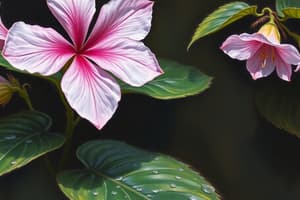Podcast
Questions and Answers
Chrysophanol is classified as an ______ compound.
Chrysophanol is classified as an ______ compound.
anthraquinone
Anthraquinones typically contain an ______ nucleus.
Anthraquinones typically contain an ______ nucleus.
anthracene
The sugars present in anthraquinones are usually ______.
The sugars present in anthraquinones are usually ______.
glycosides
Chrysophanol is a type of ______ used for various applications.
Chrysophanol is a type of ______ used for various applications.
The study of anthraquinones falls under the category of ______ chemistry.
The study of anthraquinones falls under the category of ______ chemistry.
Arabinose is a type of ______.
Arabinose is a type of ______.
An aglycone is a component in which ______ groups are attached.
An aglycone is a component in which ______ groups are attached.
Two keto groups are attached to the benzene ring in an ______.
Two keto groups are attached to the benzene ring in an ______.
Rhamnose is a ______ sugar.
Rhamnose is a ______ sugar.
The structure that includes two keto groups and a benzene ring is known as ______.
The structure that includes two keto groups and a benzene ring is known as ______.
Drugs containing ______ glycosides are stimulant cathartics.
Drugs containing ______ glycosides are stimulant cathartics.
The most widely used stimulant cathartics include Cascara bark, Frangula, and ______.
The most widely used stimulant cathartics include Cascara bark, Frangula, and ______.
______ and related glycosides are known for their mechanism of action as stimulant cathartics.
______ and related glycosides are known for their mechanism of action as stimulant cathartics.
Medicinal use and mechanism of action of anthraquinone and related ______ include their function as laxatives.
Medicinal use and mechanism of action of anthraquinone and related ______ include their function as laxatives.
Cascara bark, Frangula, and Senna leaves are classified as ______ cathartics.
Cascara bark, Frangula, and Senna leaves are classified as ______ cathartics.
The glycosides of anthranols and anthrones elicit a more drastic ______ than do corresponding anthraquinone glycosides.
The glycosides of anthranols and anthrones elicit a more drastic ______ than do corresponding anthraquinone glycosides.
Anthranols and anthrones are known to cause discomfort and a gripping ______.
Anthranols and anthrones are known to cause discomfort and a gripping ______.
The ______ of anthrones is more drastic compared to anthraquinone glycosides.
The ______ of anthrones is more drastic compared to anthraquinone glycosides.
Glycosides derived from anthranols can lead to a sensation of ______.
Glycosides derived from anthranols can lead to a sensation of ______.
Comparative studies show that anthrone glycosides produce a less severe ______ than their anthranol counterparts.
Comparative studies show that anthrone glycosides produce a less severe ______ than their anthranol counterparts.
The C-glycoside releases free anthraquinone after oxidative cleavage in the presence of ______.
The C-glycoside releases free anthraquinone after oxidative cleavage in the presence of ______.
The reaction takes place in an ______ medium.
The reaction takes place in an ______ medium.
The free anthraquinone is also known as ______ in cases of anthraquinone dimmers.
The free anthraquinone is also known as ______ in cases of anthraquinone dimmers.
During the reaction, the sugar ______ is released alongside free anthraquinone.
During the reaction, the sugar ______ is released alongside free anthraquinone.
The process of releasing free anthraquinone involves ______ cleavage.
The process of releasing free anthraquinone involves ______ cleavage.
Flashcards are hidden until you start studying
Study Notes
Anthraquinones
- Anthraquinones are glycosides with a core structure of the anthracene nucleus
- They have two keto groups attached to the benzene ring
- Common sugar moieties include arabinose, rhamnose and others
### Medicinal Uses
- Anthraquinone glycosides are used as stimulant cathartics
- Anthraquinone glycosides cause a more drastic reaction than anthranol and anthrone glycosides
Anthraquinone Action
- Anthranols and anthrones elicit a discomforting “gripping” action
- C-glycosides are activated only after oxidative cleavage in the presence of FeCl3 in acidic mediums
- Anthraquinone dimmers release free anthraquinone (or rhein) and sugar moiety
Anthraquinone Containing Drugs
- Cascara bark, frangula and senna leaves are common anthraquinone glycosides
Studying That Suits You
Use AI to generate personalized quizzes and flashcards to suit your learning preferences.




